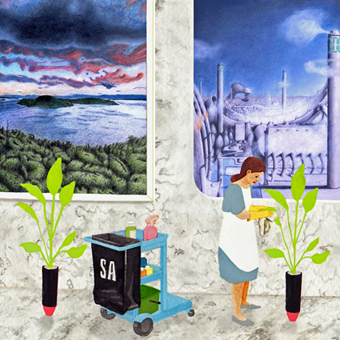In Profile: Wyatt Moss-Wellington, Sanitary Apocalypse
Oliver Downes

Sanitary Apocalypse
Artist Statement
I had the idea for a narrative about a world spray-and-wiped into apocalypse years ago after reading an article about dirt pills given to children in the United States to boost their bacteria. When I was completing my last album, Gen Y Irony Stole My Heart, I was already thinking about what I could do next to up the ambition ante: I wanted to do a long-form, orchestrated narrative song. After marrying the two ideas, I composed Sanitary Apocalypse over roughly a year, followed by a year of recording, mixing, finalising and publicising the beast.
I wanted it to come as a surprise in the story that, despite the apocalypse, people are generally getting on, doing okay and finding a way rather than regressing to violent competition and eating each other or whatever else they do in apocalyptic fantasies these days. I also worked from the principle of swapping the gender of all characters once they’ve been conjured (where gender politics aren’t integral to the narrative); you seem to get much more interesting stories that way. I ended up with a ‘final girl,’ only she doesn’t suffer quite the humiliation, breakdown and torment most final girls do.
Perhaps the most challenging thing I did was to write a bunch of themes—hopefully independently interesting—that would lock together at the climax. So I wrote those synth arpeggios and keyboard chords at the end to sound continuously ascendant, adding themes from throughout the piece until the whole thing is being played at once.
Wyatt Moss-Wellington

Wyatt Moss-Wellington
photo Stephen Lew
Wyatt Moss-Wellington
Folk phantasmagoria
Wyatt Moss-Wellington’s fiercely ambitious and willfully idiosyncratic Sanitary Apocalypse is something of an anomaly within contemporary Australian music. Described as a single 28-minute song, the work consists of distinct song-like fragments that emerge from a body of through-composed musical tissue, blending elements of folk, jazz, prog-rock, electronica and the 20th century avant-garde. It charts the journey of protagonist Clara through a disturbing post-apocalyptic vision of an Earth cleansed of all complex life.
Sanitary Apocalypse is a far cry from Moss-Wellington’s 2009 debut The Supermarket and the Turncoat, a more conventional collection of songs in the accepted manner of an acoustic guitar-wielding troubadour. Certain tendencies are clear in this earlier incarnation however: whimsically direct lyrics curling around unpredictable melodic twists; a lyrical style both tenderly heart-felt and savagely satiric; the occasional frenetic solo bursting out of unthreatening finger-picked patterns. It’s a style further developed in his more fully produced follow-up, 2011’s Gen Y Irony Stole My Heart.
With Sanitary Apocalypse, Moss-Wellington seems to have taken the limited broader reception of his earlier efforts as a license to push himself into new artistic territory. Although still embedded in the folk tradition, the concept of the folk ‘refrain’ is here refigured as a series of recurring musical idée fixe. The omniscient yarn-spinniner of folksong is re-imagined as a Greek Chorus offering commentary and information in a tone at once firmly solemn and archly ironic, a scene setting line such as “in the end we sprayed and wiped our whole world away” dismissing cataclysm with a raised eyebrow and a shrug.
There are many delights to be found here, Clara’s farewell to her dying husband featuring some beautifully realised vocal writing, perhaps reminiscent of Björk’s Medulla. This section unravels in a cluster of voices chanting over one another, fragments of lyrics thrown to the foreground before being chewed back into the mass, cohering around the words “I love you” in a gloriously illuminated moment of consonance, before collapsing into despair in the form of an unhinged solo from violinist Ian Watson.
Moss-Wellington has assembled a broad range of musicians to realise his artistic vision. One of the pleasures of this recording is hearing performers such as jazz drummer Tim Firth or The Crooked Fiddle Band’s Jess Randall brought together to produce something inclusive, unexpected and complementary, an approach suggestive of Moss-Wellington’s love of Robert Wyatt or the North Sea Radio Orchestra. It is his own vocals that command most attention however, at times relating the saga with cool detachment, at others taking advantage of his startling range for dramatic effect, straining towards his highest possible note at the moment of his heroine’s nadir, pinching the sound to a point of almost unbearable intensity on the single plaintive word “how,” stark piano chords rising into an electronic blizzard of sound before collapsing once more.
There are other moments of almost manic playfulness, a mandolin solo from Moss-Wellington becoming a mashed pastiche of motifs cribbed from violin studies. Elsewhere, the moment of Clara’s rescue is celebrated with an over-the-top bluegrass duel between Dave Carr’s banjo and Randall’s nyckelharpa. The unreality of the narrative moment is underlined by the almost too-cheerful melodic motifs and the breathless delivery of Moss-Wellington’s cartoonish lyrics describing the hyper-futuristic bunker in which Clara finds herself: “the dining room is massive / It’s bustling—full of food, and people, and smiles, water cooler banter.”
Unfolding in a comic phantasmagoria, the work ends with themes from all previous sections swirling together over an inexorably rising bass line, colliding on a single, almost screamed note before voices drop out one by one, leaving Moss-Wellington to close the epic with a single snarled note on the guitar. Self-funded, uncompromising and uncompromised, Sanitary Apocalypse is a unique musical gift.
Wyatt Moss-Wellington, Sanitary Apocalypse; http://wyattmosswellington.com/music/sanitary-apocalypse
RealTime issue #120 April-May 2014 pg. web






